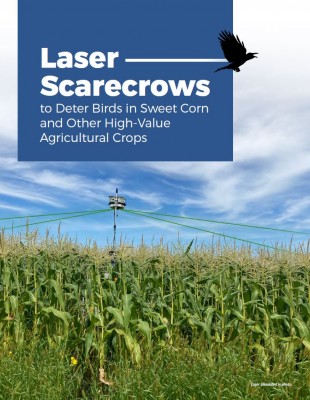Laser Scarecrows to Deter Birds in Sweet Corn
Julie Kikkert, Team Leader, Extension Vegetable Specialist
Cornell Vegetable Program

Are you considering the use of a laser scarecrow to deter birds on your farm? Cornell Cooperative Extension and the University of Rhode Island teamed up to test a research laser scarecrow on sweet corn farms.
A laser scarecrow is a device that has one or more laser modules connected to motors. The specifications of the lasers are optimized to the color and motion sensitivity of bird's eyes. When laser beams move across a field, birds become frightened and attempt to move away from the perceived threat. Light from the laser covers an area quickly and moves through the canopy without causing injury to the crop. Research demonstrates that birds do not readily become habituated to the laser.
A laser scarecrow used as the sole deterrent typically results in a significant reduction in crop damage. Combined with an auditory device, damage can be reduced even more. When used as part of an integrated management program for bird control that utilizes habitat management and multiple scare tactics, laser scarecrows can be useful tools for growers of multiple crops. All scare tactics must be deployed before birds find the field. The effectiveness of lasers depends on multiple factors such as bird species, bird populations, habitat and food availability. Lasers are not effective at deterring deer, racoons, coyotes or other mammals.
To learn more, the Laser Scarecrows to Deter Birds in Sweet Corn and Other High-Value Agricultural Crops fact sheet provides background information, research data, FAQs, and Advantages/Limitations on laser scarecrows.
Laser Scarecrows to Deter Birds in Sweet Corn and Other High-Value Agricultural Crops (pdf; 1316KB)

Upcoming Events
Genesee Valley Winter Produce Meeting
January 20, 2026
Farmersville, NY
Fresh market production meeting for small to mid-sized farms. Topics include: fundamentals of plant disease management, keeping yourself safe while spraying (organic & conventional), mushrooms, white mold management, selling at auction, and soil health.
Chautauqua Region Winter Vegetable Meeting
January 30, 2026
Randolph, NY
Fresh market production meeting for small to mid-sized farms. Topics include: vegetable disease management, keeping yourself safe while spraying (organic & conventional), soil and water sampling, managing soil organic matter, grower panel, industry and programmatic updates.
DEC credits available: 1.0 in CORE plus 1.5 in 1a and 23.
Eden Area Winter Vegetable Meeting
February 4, 2026
North Collins, NY
Join us for a mix of industry updates, crop protection talks, pesticide safety programming, and fertility management discussions. This meeting is jointly hosted by the Cornell Vegetable Program and Timac Laing-Gro.
1.25 DEC credits available in CORE plus 1.75 in 1a and 23.


































